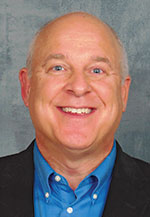Ken’s 12-Pack / Ken Ogorek
Things most Catholics wish they knew better about their faith: “Houston, we have a problem …”

Fifth in a yearlong catechetical series
This column has been addressing doctrinal deficiencies in religious education throughout the 1970s and 1980s, hopefully in a lighthearted and relevant way. Of all the gaps in catechesis and culture, one of the most serious concerns a question: “What does it mean to be human?”
Getting this answer wrong—the way we see what distinguishes the human person from the rest of God’s creation—has huge implications for nearly all areas of your life: money, sex, politics, religion—you name it!
Anthro-What?!
A fancy word for your view of the human person is anthropology. Are people bodies-only, or do you have a soul? Do we really have free will, or are our actions pretty much determined by genetics, where we grew up, our impulses in the moment, etc.? And just why do we tend to misbehave at times anyway? These are enormous questions with life-changing consequences depending on how you answer them.
The Christian view of the human person includes several key traits—characteristics that weren’t taught well in classrooms (religion or otherwise) from the late 1960s through the early 1990s. Christian anthropology includes truths like:
-
The human person is inherently spiritual and not reducible to the merely material;
-
We are created in God’s image and likeness, disfigured by sin and in need of the restoration only Jesus offers;
-
You are a creature, not the Creator, with the desire for God written in your heart and a natural tendency to respond in love to God—who loves you first.
Well-begun is
half-done
Clarity on what it means to be human gives us important perspective on how we should live. We prioritize the dignity of each human person, for example. We love and respect everyone unconditionally, even folks we might not like or admire.
With the Christian view of the human person firmly in place, various societal ills diminish greatly. Archbishop Charles C. Thompson lists several of these struggles in his pastoral letter “We Are One in Christ: A Pastoral Letter To the Clergy, Religious and Faithful People of Central and Southern Indiana On Fundamentals of Christian Anthropology”:
-
Violations against the sanctity of human life;
-
Plight of immigrants, migrants and refugees;
-
Racism, drug abuse, unjustified use of violent force;
-
Threats against religious liberty.
Clearly Christian anthropology lays a firm groundwork for our life together as an authentically human community. (cutt.ly/Pastoral2018)
Savior? Who needs a savior?!
We’re all wounded by original sin. We’re all vulnerable to temptation. We all need salvation from sin and death.
If your view of the human person doesn’t include the reality of sin and its ultimate solution, little urgency is present about connecting with Jesus, living in communion with his body, the Church, and witnessing to others—encouraging folks to be loving disciples of Jesus.
On the other hand, when you acknowledge the human person as awesome yet in need of the salvation only Jesus can give, you hunger for a disciple relationship with him, for opportunities to encounter Christ in various ways, for fulfilling his command to be a disciple-maker (Mt 28:18-20).
In this monthly column, I’ve been hard on catechetical efforts of the 1970s and 1980s. Not to paint with too broad a stroke, some good catechesis was occurring in those times as well, and our culture forms us powerfully no matter what religion textbook we use.
But honesty about deficiencies in doctrinal content helps us understand our current state and clarify our vision for the future. That’s a big goal of Ken’s 12-Pack.
(Ken Ogorek, archdiocesan director of catechesis, has lost his six-pack
abs. But his 12-part series, whose theme is: Things Most Catholics
Wish They Knew Better, will run through December. He can be
reached at his archdiocesan e-mail address kogorek@archindy.org or
by using the contact information at
www.kenogorek.com.) †
